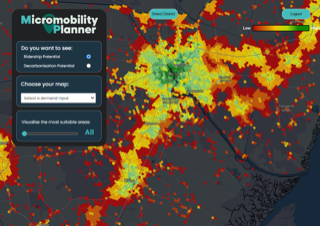Momentum Transport Consultancy and Spatial Design Hub have announced the launch of Micromobility PlannerTM – a cutting-edge geospatial analysis software tool and app designed to enable local authorities to optimise shared micromobility networks.
Developed for use by counties, local authorities and combined authorities, the subscription-based online tool is set to empower decision makers in UK and Ireland towns and cities to strategically plan micromobility, including eScooters and eBikes, as part of efficient, equitable and sustainable local transport plans.
Micromobility Planner has been developed with funding from The Department for Transport (DfT) in partnership with Connected Places Catapult through Transport Research and Innovation Grants’ (TRIG) local transport decarbonisation strand.
A new era in micromobility planning
Steve Hands, Transport Planner and Shared Micromobility Lead at Camden Council said: “Micromobility Planner would be particularly helpful to boroughs starting their micromobility journey. It provides valuable data to help with scheme planning and inform conversations with micromobility operators. In our experience, it’s essential to put parking zones in the right places to ensure all areas have access to these transport options and the zones meet local demand.”
Micromobility Planner addresses key challenges in the fast-evolving landscape of shared micromobility planning by providing:
- Comprehensive demand insights: The tool leverages census data and geospatial analytics to pinpoint areas of high demand, helping cities strategically deploy resources and micromobility services, maximise ridership potential, reduce carbon emissions and address transport deserts. The software can be used to determine the most suitable areas to start a new shared micromobility scheme, or to extend an existing one, and to define the shared micromobility scheme planners want to see by inputting desired operating areas and fleet size.
- Parking optimisation: By calculating parking density and accessibility requirements, the tool assists in designing infrastructure that reduces conflicts with pedestrians and minimises disruptions to car parking revenue. With Micromobility Planner, towns and cities can quickly decide how much micromobility parking space to provide and where to locate it, to avoid challenges such as pavement clutter.
- Customisable scenarios: Local authorities can easily model different scenarios to optimise docked and dockless bike schemes, eScooters and other shared micromobility systems.
- Sustainability alignment: The software integrates metrics to support cities’ sustainability and carbon-neutral goals.

Will Durden, managing director at Momentum said: “Local authorities are under pressure to reduce carbon emissions, promote sustainable transport and manage traffic congestion – and well-designed shared micromobility schemes, such as eBikes and eScooters, have great potential to redefine how people move around our towns and cities. But their integration comes with challenges.
“We have already seen several micromobility trials ending and being removed across the UK, and in large part we believe this is down to a lack of data, information and strategic exchange on questions such as fleet size, where micromobility hubs and parking locations should be placed and how many are needed to optimise their effectiveness.
“Local authorities currently have no choice but to rely on information from operators or to commission bespoke studies, both of which can be expensive. For a monthly subscription Micromobility Planner puts independent evidence at the fingertips of all local authorities in the UK and Ireland for the very first time, allowing them to take strategic, data-driven decisions on how micromobility can plug into their local transport networks most effectively.”
James O’Brien, founder of Spatial Design Hub added: “Our aim with Micromobility Planner is to combine Momentum’s bespoke consultancy with Spatial Design Hub’s expertise in geospatial analysis, and bespoke cloud-based technology solutions. As a result, Micromobility Planner harnesses powerful GIS data and analytics to give decision makers highly-granular, independent information which they can use to review and align operators’ proposals with their local priorities.
“This is a first for the UK and Ireland, and we believe it can revolutionise shared mobility by putting transport planners at towns and cities in the driving seat. We’re confident that more places will be able to plan seamless, user-friendly and environmentally-conscious shared micromobility networks by using Micromobility Planner, and taking more informed, strategic decisions.”






Recent Comments